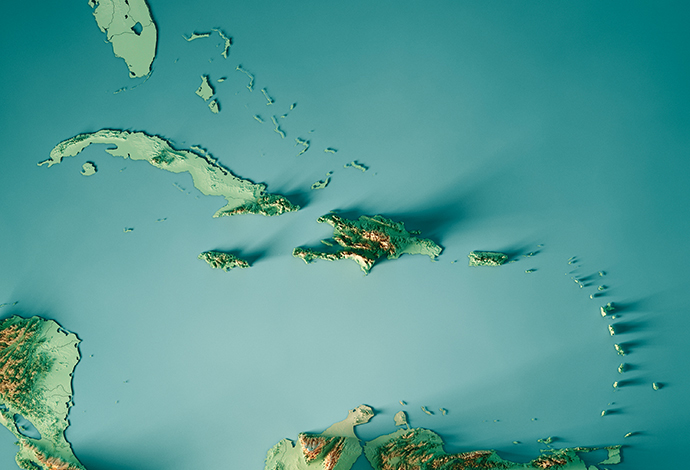The Caribbean region is strengthening its ties to markets around the world, most recently with Singapore and Norway. In October, Singapore’s second Ambassador to CARICOM, Her Excellency Karen Tan, said her appointment represented Singapore’s commitment to "continue to work to sustain and deepen" its engagement with the region, and to find new avenues for cooperation. CARICOM, the Caribbean Community, is a grouping of 20 countries — 15 member states and five associate members, stretching from the Bahamas in the north to Suriname and Guyana in South America. To date, she noted, 1,060 officials from CARICOM have participated in various programs including public administration, urban planning, finance, information technology and civil aviation in Singapore.
Ambassador Tan said cooperation in Disaster Risk Management or Information and Communication Technology (ICT) is also available. This offer was announced in 2017 by Singapore’s Foreign Minister, His Excellency Dr. Vivian Balakrishnan, when he met the CARICOM Council for Foreign and Community Relations (COFCOR) during its 10th Special Meeting on the sidelines of the 72nd United Nations General Assembly. Singapore is also working with partners in Latin America such as Chile and Argentina to offer Third Country Training Programs for CARICOM; opportunities Ambassador Tan said she hopes officials will maximize.
Ambassador Tan said the Association of Southeast Asian Nations (ASEAN) can be a useful partner for CARICOM in the areas of trade, investment promotion and sustainable development, with Singapore serving as chair for this year. CARICOM Secretary-General Irwin LaRocque welcomed the opportunity to work together with ASEAN in areas of shared interest. He said CARICOM has recognized, and he has personally witnessed, the significant advancements Singapore has made in infrastructural, environmental, social and sustainable development and in ICT.
The Secretary-General expressed appreciation for Singapore’s offer to support the CARICOM’s vision to become the first climate-resilient region in the world. He also commended the country for designating 2018 as the "Year of Climate Action," to raise national consciousness around the need to take individual and collective action to fight climate change for a sustainable Singapore.
Singapore and CARICOM have worked in unison, Ambassador Tan noted, to advance their common interests and to overcome challenges in international fora like the United Nations and in groupings such as the Alliance of Small Island States (AOSIS) and the Commonwealth of Nations. In 2015, she co-chaired the Preparatory Committee of the 3rd Small Island Developing States (SIDS) Conference in Samoa which allowed SIDS to promote key aspect of the Sustainable Development Goals. Singapore’s ties with the region date back to 1971 when it established diplomatic relations with Trinidad and Tobago.
Alliance to Target Clean and Healthy Oceans
Norway also has a new envoy to the Caribbean Community. Ingrid Mollestad presented her Letters of Credence to the Secretary-General at the headquarters of the CARICOM Secretariat in Georgetown, Guyana, in October. On the sidelines of the 73rd United Nations General Assembly in New York, CARICOM Foreign Ministers, the Secretary-General, and the Assistant Secretary-General for Foreign and Community Relations had discussions with the Nordic countries at an annual breakfast engagement which was attended by Crown Prince Haakon of Norway.
Ambassador Mollestad said the Memorandum of Understanding signed between the CARICOM Foreign Ministers and Norway in 2016, provided an excellent framework for further work in areas in which her country has keen interests including climate change, climate adaptation and resilience, clean and healthy oceans and the blue economy.
The Association of Southeast Asian Nations (ASEAN) can be a useful partner for CARICOM in the areas of trade, investment promotion and sustainable development.
In that context, Ambassador LaRocque noted that the Community welcomed the structured review of the regional fisheries sector aimed at strengthening capacity. He said CARICOM also appreciated the comprehensive marine survey of the region to be undertaken by a Norwegian Research Vessel. In addition, he said the establishment of a High-Level Panel for a Sustainable Ocean Economy, aimed at promoting science-based decision-making in the fields of ocean economy and ocean management, is of great relevance to CARICOM, comprised for the most part of small states with large marine territories.
"Balancing our development aspirations with our desire to be more respectful of our marine, and land, environment is a major priority for CARICOM," he said, expressing appreciation for this kind of cooperation from "friendly countries such as the Kingdom of Norway."
He said the Community welcomed the statement in New York by Norway’s Foreign Minister that the Nordic countries supported the removal of the GDP criteria, in respect of Overseas Development Assistance (ODA) for small, middle-income countries which have been affected by natural disasters.
This follows on the statement by Norway`s Minister for International Development, His Excellency Nikolai Astrup, in May, when he told CARICOM Foreign Ministers that Norway’s official position was that graduated countries should be eligible for ODA when their economic base is ruined by a catastrophe.
Noting that concessional financing should not hinge on a disaster, Secretary-General LaRocque said CARICOM proposes that "per capita income criteria should not apply in instances where countries are seeking to invest in building resilience to climate change before a disaster occurs."

